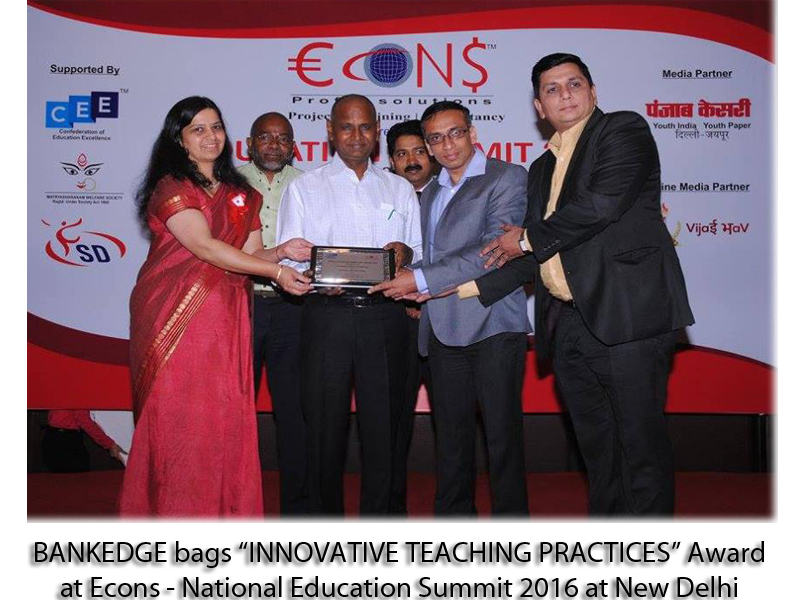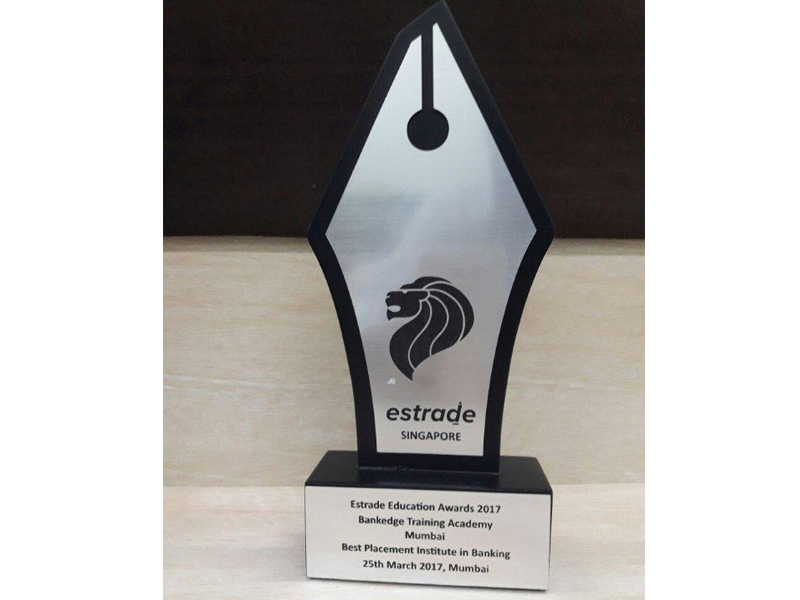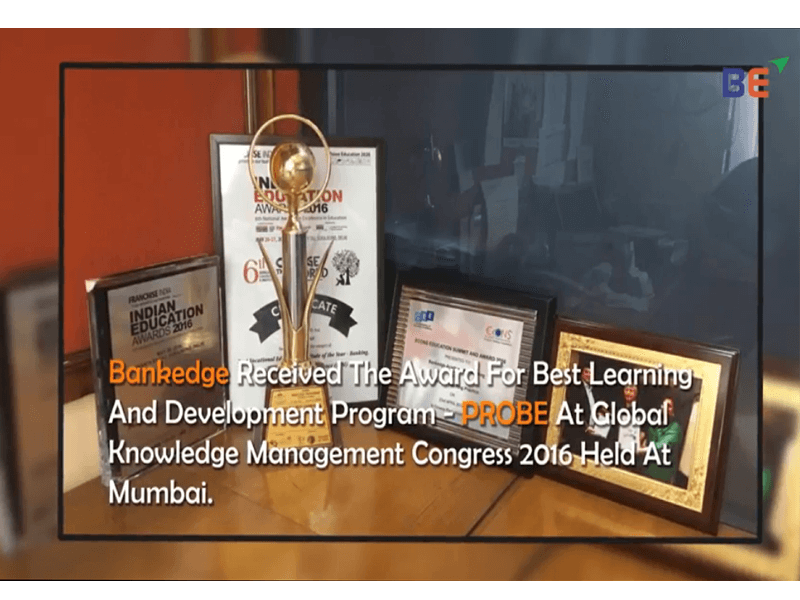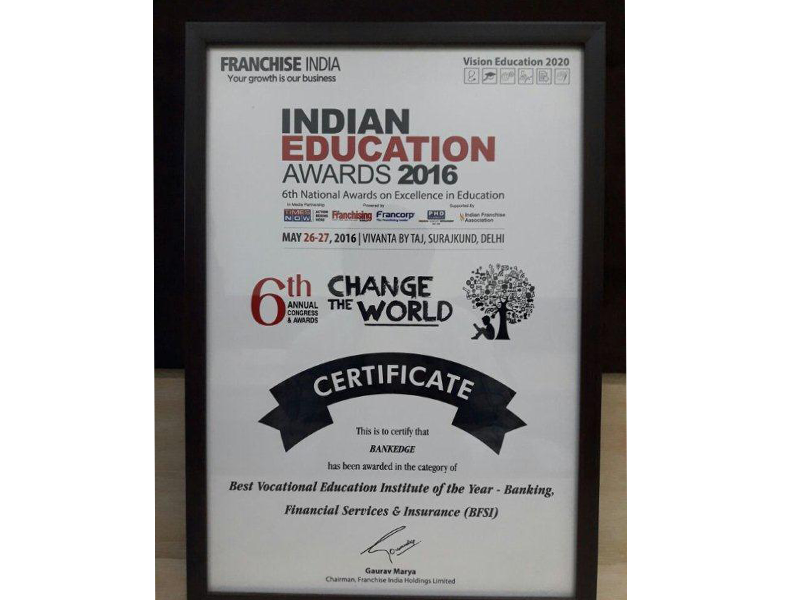1800 266 0777

Credit Administrative refers to managing Loans Portfolio which mainly relates to Corporate Loans. Financial institutions, both Banks and NBFCs extend Credit facilities either in the form of Working Capital or Term Loan or other Non-financial facilities like Letter of Credit or Bank Guarantees, which relate both to Domestic and International transactions.
Corporate Banking Career
The Kotak Credit Administration Program is an opportunity to start a career in Credit Operations with Kotak Bank, India’s No. 1 Private Bank. BANKEDGE will conduct an intensive pre-selection process in conjunction with Kotak Bank. This will comprise an aptitude test followed by a personal interview round. All selected candidates are issued a ‘Conditional Offer Letter’ post which they are trained on Credit Operations for 30 days. Post completion of the training program, the candidate will start working in Wholesale Banking Group for the Credit Administration department. The locations are Santa Cruz and Kalina-Mumbai.
Comprehensive Coverage & Certification
The 30 days of rigorous classroom training is augmented through the use of banking simulations, real-life case studies, and role play, thus preparing the candidate to handle their job responsibilities more effectively. The curriculum has been designed and taught by experienced industry professionals who have over 10 years of experience in this domain.
Kotak Bank Job Ready Model in Credit Administration
The training progress will be closely monitored by Kotak Bank via regular interactions and assessments. Upon successful completion, the candidate will be placed as a Assistant Manager, Credit Administration with Kotak Bank at a salary of Upto Rs.3.5 lakhs per annum + city allowances, depending on location.
UNIT / TOPIC
OBJECTIVE
I. Understanding Financial Landscape
Understand the framework of the financial system, the roles of the banking system, different banking products and banking framework in different countries.
What is finance and financial sector?
Objective: to establish the need for the financial sector in an economy
Introduction to Banking
Objective: to explain the role, structure, purpose and functioning of banking
II. Overview of Trade Finance and Trade Finance Products
Explain the importance of trade finance, important products and the opportunities for banks in this area.
Nature of international trade and role of trade finance
Explain the nature of international trade and name the parties to a trade; explain the unique features of international trade, it’s challenges and the role of trade finance.
Methods of payment, and risk/reward of each type
Explain the different payment types and their risks and benefits to each of the parties concerned (buyer, seller, banks)
Trade Documents
Explain the classification of different trade documents and the salient features of each document.
INCOTERMS 2010
Explain the features, uses and limitations of INCOTERMS.
Trade Finance Products – Commonly used ones
Explain the use and features of Collection Services, LC’s, Guarantees, Reimbursement and Financing.
Guidelines governing International trade finance
Explain the different guidelines / codes/ practices and what they are applicable to; Explain the important clauses of each.
III. Mechanics of Trade Products in detail and International Practices; Reconciliation and Accounting; SWIFT
Lifecycle of Trade Finance Products.
LC’s – Issuance, Confirmation, Transfer, Assignment, Negotiation; Collections and reimbursement processes; Processes related to guarantees.
Reconciliation and Accounting
Explain the reconciliation process; importance of liability accounting and nostro reconciliation
Forex Arithmetic
Basics of treasury rates, calculations, forex markets.
SWIFT
Objective : Explain the use of SWIFT, and it’s application specific to Trade Finance.
IV. Regulations and Compliance
To explain the regulatory framework and it’s importance in international trade finance (from the point of view of sanctions, embargoes, illegal activities etc).
Anti Money Laundering
Objective : Explain the concept of Money Laundering with practical examples; Implications of money laundering – financing of illegal activities and terrorism, tax evasion, loss to government exchequer; How trade finance can be used as a conduit to launder money and precautions to be taken by banks in this regard. Discuss the important regulatory bodies dealing with Trade Based Money Laundering activities.
Embargoes and Sanctions
Topics : Definition of Embargoes and Sanctions; who issues them; importance of these concepts; implications of non compliance.
Risks In Trade Finance
Understand Risks associated with processing of trade finance transactions.
Red Flags – Do’s and Don’t’s
Outlines of Do’s and Don’t’s in handling trade finance transactions.
Additional Case Studies
Case Studies pertaining to documentary credits, guarantees and important trade processes.
Client Onboarding
Topics : Concept of KYC; what is generally collected as KYC documents; important KYC documents for businesses in select geographies; PEP and important safeguards.
Soft skills
Business Communication
Time Management – 8 hours
Niche Domain
Develop in-depth knowledge of Corporate Banking, combined with Compliance and Regulatory frameworks.
Deal with high-value transactions, and understand how complex, multi-party transactions are executed.
High Impact Career
Become part of one of the fastest growing sectors in India. Trade Finance is of vital importance to the global economy as the World Trade Organization estimates that 80 to 90% of global trade depends on Trade Finance.
Prestigious Brand
Work for India’s No. 1 Private Bank and winner of multiple awards for Best Bank in India across categories. The bank offers its employees a great work environment, competitive compensation, along with excellent employee benefits.
Execution Skills
Work with and learn from highly driven teams in a cutting-edge work environment encompassing complex processes, high-end technology, dynamic markets and products.
Admission Criteria:
Graduate in any stream
Experience:
0–1 year of work experience
60% Minimum in Academics
Less than 25 years of age
Admission Process:
BANKEDGE follows a rolling admission process comprising an initial assessment followed by a personal interview.
There are two ways to enroll:
1. Physical Enrollment
Walk into either our Delhi, Kolkata, Mumbai, Ahmedabad, Pune, Hyderabad, Bangalore or Chennai centers to receive a personal counseling session, which will be followed by an assessment and an interview.
2. Online Enrollment
Click below to fill in the online assessment form. Our Coordinators will reach you immediately. After telephonic discussion, you will receive an online Assessment link.
Upon clearing the assessment and the personal interview, you will then face a final interview with Kotak Bank. You can then register and enroll in the next Kotak Bank Trade Finance program
- PROGRAM HIGHLIGHTS
-
Corporate Banking Career
The Kotak Credit Administration Program is an opportunity to start a career in Credit Operations with Kotak Bank, India’s No. 1 Private Bank. BANKEDGE will conduct an intensive pre-selection process in conjunction with Kotak Bank. This will comprise an aptitude test followed by a personal interview round. All selected candidates are issued a ‘Conditional Offer Letter’ post which they are trained on Credit Operations for 30 days. Post completion of the training program, the candidate will start working in Wholesale Banking Group for the Credit Administration department. The locations are Santa Cruz and Kalina-Mumbai.
Comprehensive Coverage & Certification
The 30 days of rigorous classroom training is augmented through the use of banking simulations, real-life case studies, and role play, thus preparing the candidate to handle their job responsibilities more effectively. The curriculum has been designed and taught by experienced industry professionals who have over 10 years of experience in this domain.
Kotak Bank Job Ready Model in Credit Administration
The training progress will be closely monitored by Kotak Bank via regular interactions and assessments. Upon successful completion, the candidate will be placed as a Assistant Manager, Credit Administration with Kotak Bank at a salary of Upto Rs.3.5 lakhs per annum + city allowances, depending on location.
- CURRICULUM
-
UNIT / TOPIC
OBJECTIVE
I. Understanding Financial Landscape
Understand the framework of the financial system, the roles of the banking system, different banking products and banking framework in different countries.
What is finance and financial sector?
Objective: to establish the need for the financial sector in an economy
Introduction to Banking
Objective: to explain the role, structure, purpose and functioning of banking
II. Overview of Trade Finance and Trade Finance Products
Explain the importance of trade finance, important products and the opportunities for banks in this area.
Nature of international trade and role of trade finance
Explain the nature of international trade and name the parties to a trade; explain the unique features of international trade, it’s challenges and the role of trade finance.
Methods of payment, and risk/reward of each type
Explain the different payment types and their risks and benefits to each of the parties concerned (buyer, seller, banks)
Trade Documents
Explain the classification of different trade documents and the salient features of each document.
INCOTERMS 2010
Explain the features, uses and limitations of INCOTERMS.
Trade Finance Products – Commonly used ones
Explain the use and features of Collection Services, LC’s, Guarantees, Reimbursement and Financing.
Guidelines governing International trade finance
Explain the different guidelines / codes/ practices and what they are applicable to; Explain the important clauses of each.
III. Mechanics of Trade Products in detail and International Practices; Reconciliation and Accounting; SWIFT
Lifecycle of Trade Finance Products.
LC’s – Issuance, Confirmation, Transfer, Assignment, Negotiation; Collections and reimbursement processes; Processes related to guarantees.
Reconciliation and Accounting
Explain the reconciliation process; importance of liability accounting and nostro reconciliation
Forex Arithmetic
Basics of treasury rates, calculations, forex markets.
SWIFT
Objective : Explain the use of SWIFT, and it’s application specific to Trade Finance.
IV. Regulations and Compliance
To explain the regulatory framework and it’s importance in international trade finance (from the point of view of sanctions, embargoes, illegal activities etc).
Anti Money Laundering
Objective : Explain the concept of Money Laundering with practical examples; Implications of money laundering – financing of illegal activities and terrorism, tax evasion, loss to government exchequer; How trade finance can be used as a conduit to launder money and precautions to be taken by banks in this regard. Discuss the important regulatory bodies dealing with Trade Based Money Laundering activities.
Embargoes and Sanctions
Topics : Definition of Embargoes and Sanctions; who issues them; importance of these concepts; implications of non compliance.
Risks In Trade Finance
Understand Risks associated with processing of trade finance transactions.
Red Flags – Do’s and Don’t’s
Outlines of Do’s and Don’t’s in handling trade finance transactions.
Additional Case Studies
Case Studies pertaining to documentary credits, guarantees and important trade processes.
Client Onboarding
Topics : Concept of KYC; what is generally collected as KYC documents; important KYC documents for businesses in select geographies; PEP and important safeguards.
Soft skills
Business Communication
Time Management – 8 hours - CAREERS IN TRADE FINANCE
-
Niche Domain
Develop in-depth knowledge of Corporate Banking, combined with Compliance and Regulatory frameworks.
Deal with high-value transactions, and understand how complex, multi-party transactions are executed.
High Impact Career
Become part of one of the fastest growing sectors in India. Trade Finance is of vital importance to the global economy as the World Trade Organization estimates that 80 to 90% of global trade depends on Trade Finance.
Prestigious Brand
Work for India’s No. 1 Private Bank and winner of multiple awards for Best Bank in India across categories. The bank offers its employees a great work environment, competitive compensation, along with excellent employee benefits.
Execution Skills
Work with and learn from highly driven teams in a cutting-edge work environment encompassing complex processes, high-end technology, dynamic markets and products.
- ADMISSIONS
-
Admission Criteria:
Graduate in any stream
Experience:
0–1 year of work experience
60% Minimum in Academics
Less than 25 years of ageAdmission Process:
BANKEDGE follows a rolling admission process comprising an initial assessment followed by a personal interview.
There are two ways to enroll:
1. Physical Enrollment
Walk into either our Delhi, Kolkata, Mumbai, Ahmedabad, Pune, Hyderabad, Bangalore or Chennai centers to receive a personal counseling session, which will be followed by an assessment and an interview.
2. Online Enrollment
Click below to fill in the online assessment form. Our Coordinators will reach you immediately. After telephonic discussion, you will receive an online Assessment link.
Upon clearing the assessment and the personal interview, you will then face a final interview with Kotak Bank. You can then register and enroll in the next Kotak Bank Trade Finance program
OUR STUDENTS ARE PLACED HERE
Ten Reasons Why You Should Join the Banking Sector in India!
1. Scope for Individual Growth
For talented and dynamic professionals, the competitive environment of the banking sector provides ample scope for individual, vertical growth. It provides employees an ambiance that is conducive to scaling new personal heights and improving job profiles
2. Variety
The banking sector is one of the most diverse sectors to work in. The choice of jobs as well as the variety in types of work that it offers ensures that there is a profile that will definitely suit your interests and aptitude. From Bank Probationary Officer to Financial Analyst, from Account Manager to Specialist IT Officer, there is a wide range of options to choose from.
3. Challenges
The work in the banking sector is multifaceted and you can keep monotony away by challenging yourself at work. This is a highly motivating factor for people who are ambitious and seek to develop their personality. With both physically and mentally stimulating work, you can work at the optimum levels of endeavour.
4. Opportunity for Growth of the Economy
Finance is a major part of the focus of any government’s policies. Banking can be safely called as the backbone of the Indian economy. Working in the banking sector provides an opportunity to each employee to contribute towards the growth of the economy through his work, whether mammoth or miniscule. There is indeed no better way to simultaneously work for yourself and serve the country too!
5. Extensive Traveling
Jobs in the banking sector can involve settling in different parts of the country, and sometimes abroad too. A banking job entails a lot of travelling for various purposes. This includes both domestic and international travel. As such, one is able to work and enjoy leisure at the same time by breaking the monotony of a mundane office.
6. Handsome Salaries
Let’s face it! Money matters! Today’s generation looks at money as a source of happiness. When good money can be made from work that interests and suits you, nothing like it. In this regard, the banking sector proves to be the best bet. A handsome remuneration is what you get for your work in a bank. They also give out bonuses and other incentives over the course of your employment based on your merit and seniority.
7. Creativity
A job in the banking sector is an evolving job. With more and more money being generated every day in newer and newer ways, the roles and responsibilities of banks also change regularly. With the injection of business principles into banking, creativity at work is now valued more than ever. With the advent of mobile and internet banking and with the push for global financial inclusion, there is no ceiling to how creative you are allowed to get.
8. Exposure through Communication
A major part of banking revolves around providing essential services to customers. Communication and interaction with these customers is of utmost importance. This interaction provides the basis for exposure of employees to different types of people with varied needs and lifestyles. This experience greatly enhances one’s skill sets and confidence in the long run.
9. Job Security
A job in a public sector bank is considered a job for life. With opportunities to advance at work and not worry about being fired because of downsizing or a bad economy, it is easy to see why banking is considered so attractive a sector. Add regular perks to the mixture and banking is the sector to strive for.
10. Job satisfaction
Given all the perks and advantages of a lucrative job in the banking sector, attaining satisfaction in this work is inevitable. Since job satisfaction is one of the most important criteria in a selecting a job these days, it is also one of the most convincing reasons why one must opt for work in the banking line.



























































